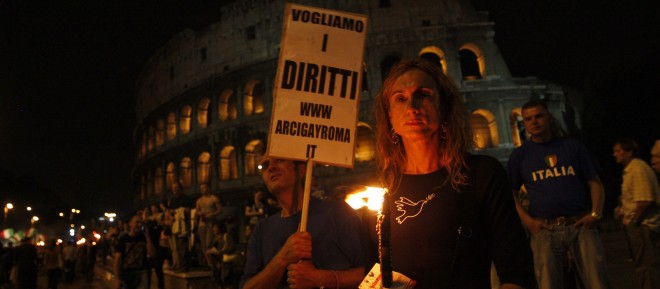The perils of being LGBT in Italy
Where the closets are crowded with a lot more than Prada and Gucci
Share

After being punched in the nose and called a “f—ing faggot” outside a bar in Reggio Calabria, Italy on April 13, Claudio Toscano must have assumed his ordeal was over once he got to the hospital. But as he told Il Quotidiano della Calabria newspaper, that’s when the psychological attacks began: “Are you gay?” asked a paramedic in the emergency room. “I can recommend a psychologist. Hormonal treatments can heal you.”
Welcome to the world of LGBT in Italy, where the legal and cultural progress felt elsewhere in the Western world is all but absent. In February, the popular satirical TV news program Le Iene (“The Hyenas”) helped bring to justice Sicilian “magician” Alfio Sciacca, who claimed to heal people from the “sickness” of homosexuality. Le Iene learned of Sciacca after receiving complaints from a number of his fraud victims.
“It’s a great shame, but from this point of view, our country is still in the Middle Ages,” says lesbian activist and parliamentarian Anna Paola Concia. In April 2011 she and her partner were walking hand-in-hand down a crowded street in Rome when a man shouted, “F—ing lesbians. They should have sent you to the ovens!” No one came to their defense; some even reproached Concia for responding angrily. And they were lucky to be downtown—such encounters usually escalate to physical violence on the outskirts of Rome.
“The Catholic Church is such a big influence, that’s why they are 20 to 40 years behind the rest of Europe on everything,” says Eric Veroliemeulen, a Dutch hotelier who’s marrying his U.S.-born fiancé Jeremy Boudreau in Holland, despite the fact that they both live and work in Italy. “Even if they create hate towards us, you’re not allowed to criticize the Church. It’s off limits,” says Boudreau.
In fact, Concia refrains from condemning the Vatican. “Frankly, I don’t expect the pope to say that homosexuals can marry. Blaming the Church shifts responsibility away from the government, which is far more homophobic than the country itself. It’s closed, obtuse, vicious: I feel much less comfortable inside parliament than outside it.”
Vladimir Luxuria, a transgender politician and reality TV star, views the Church and State more like partners in crime. “The problem is the Vatican addresses not only the faithful but all citizens, and especially politicians. They want what they consider sinful to be illegal. So, unlike other nations, there is no law that recognizes gay couples, lesbian couples, no law against homophobia.”
Such pervasive discrimination among the country’s highest echelons inevitably filters down. “It doesn’t help when you have figures like [former Prime Minister] Berlusconi who say things like ‘it’s better to be a womanizer than be gay.’ That falls on the ears of the entire country,” says Boudreau. “Go into any trattoria, any home and they’ve got a television on at dinner. We’re talking about a country that is spoon-fed a lot of opinion by the state media.”
Photographer Silio Danti acknowledges how lucky he is that his family reacted well when he came out. “Unfortunately Italian egoism precludes any great sense of altruism or open love. The Italian family can be a bit stifling in how they try to determine the lives of their children according to their own ways of being.”
LGBT Italians in the fashion world seem to enjoy greater acceptance, but Danti says this is a façade. “I know owners of major companies who don’t like homosexuals yet keep them on staff because they’d go bankrupt without them. So it’s an extremely limited kind of acceptance. It can even be fashionable or trendy to say they’re accepted, which makes me sad.”
Non-creative professionals tend to keep the closet doors shut. “It’s just safer in general not to say anything,” says lesbian videographer Elena Foresto. “If you’re a teacher, for example, you can be sure some parent will say, ‘you turned my son into a fag because you’re a fag’. ” However, Foresto says things can be a bit easier for lesbians than for gays. “Probably because of the whole Latin-lover thing. Women holding hands is not as big a deal as men doing that.” There is also a glaring lack of butch lesbians and female-to-male transgender people in Italy. “That would be too offensive to the public eye.”
According to ILGA Europe, the only EU country with a worse LGBT-rights record is Cyprus. “What profoundly distinguishes Italy from the rest of Europe is this culture of silence, this tradition of completely removing homosexuals from the public sphere,” explains Paolo Patanè, the director of the Italian LGBT-rights group Arcigay. “This is very serious, it means erasing the human, social and public dignity of millions of people.”
Luxuria has not forgotten what life was like before she became a household name in Italy. “I still remember when I was just like any other unknown tranny and the problems I faced, the discrimination, the beatings, the insults on the street, the suspicious looks. The worst thing of all was that outside people laughed at me while at home my mom cried for me.”